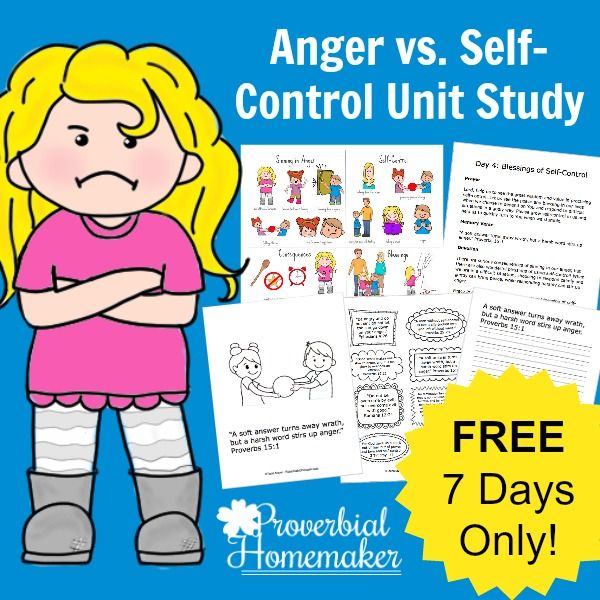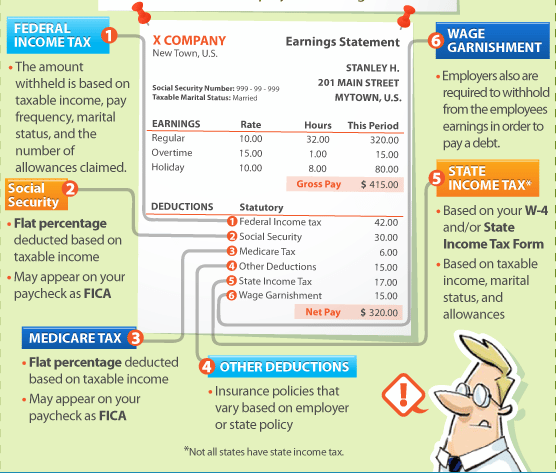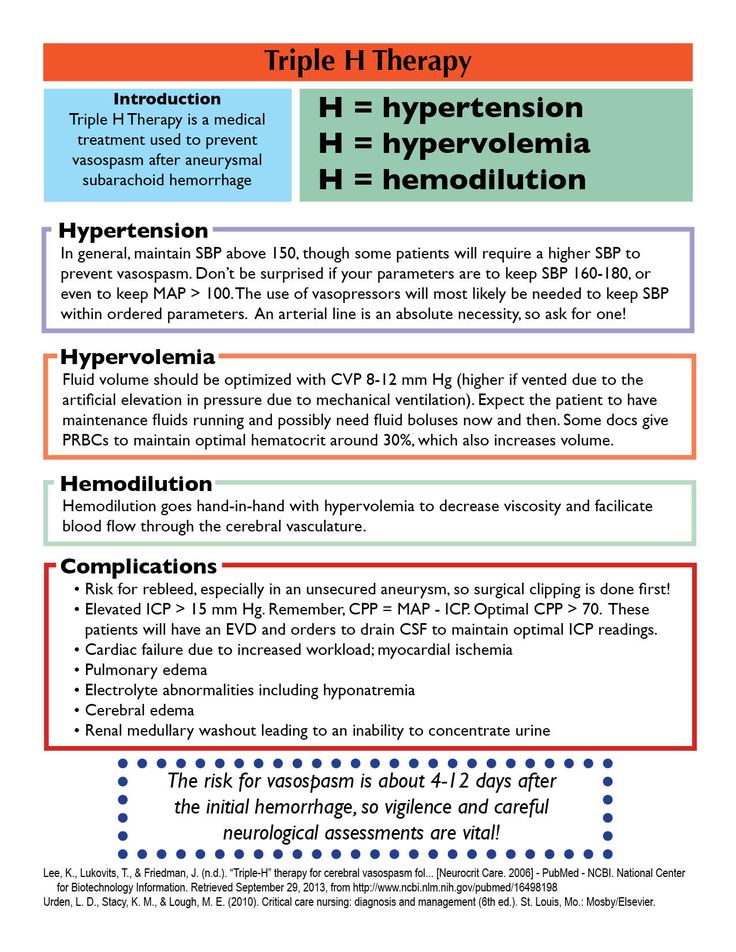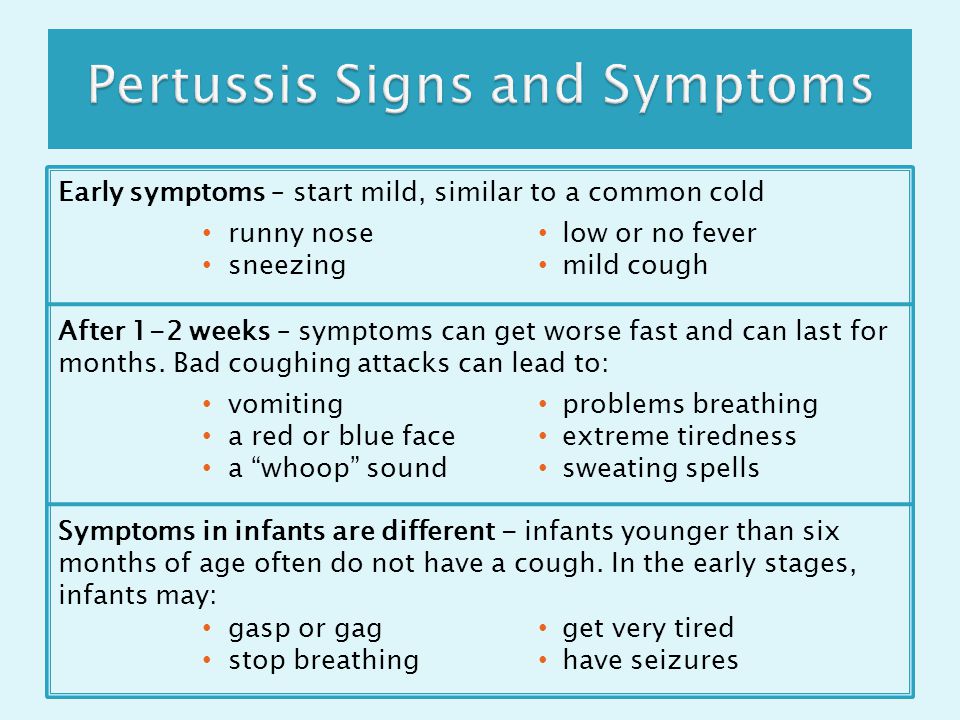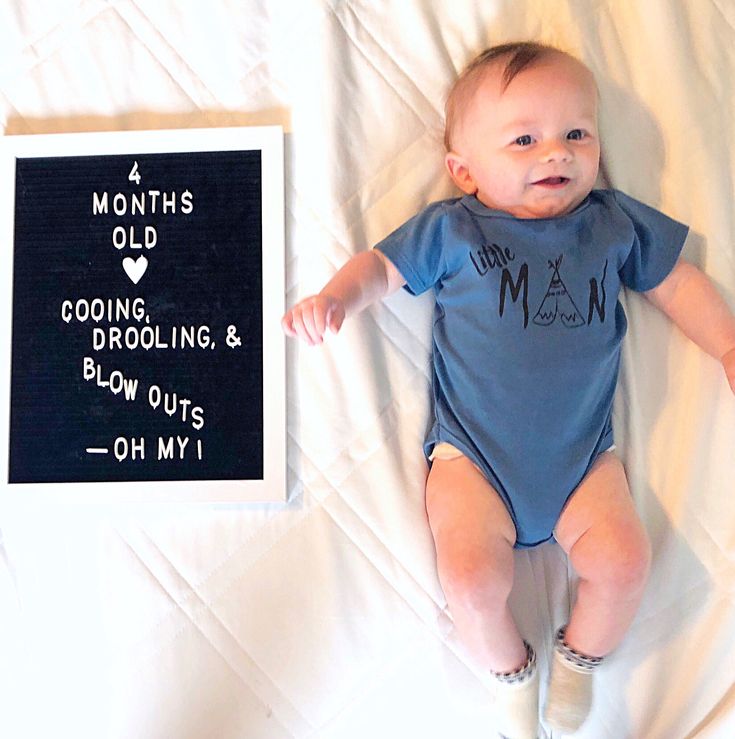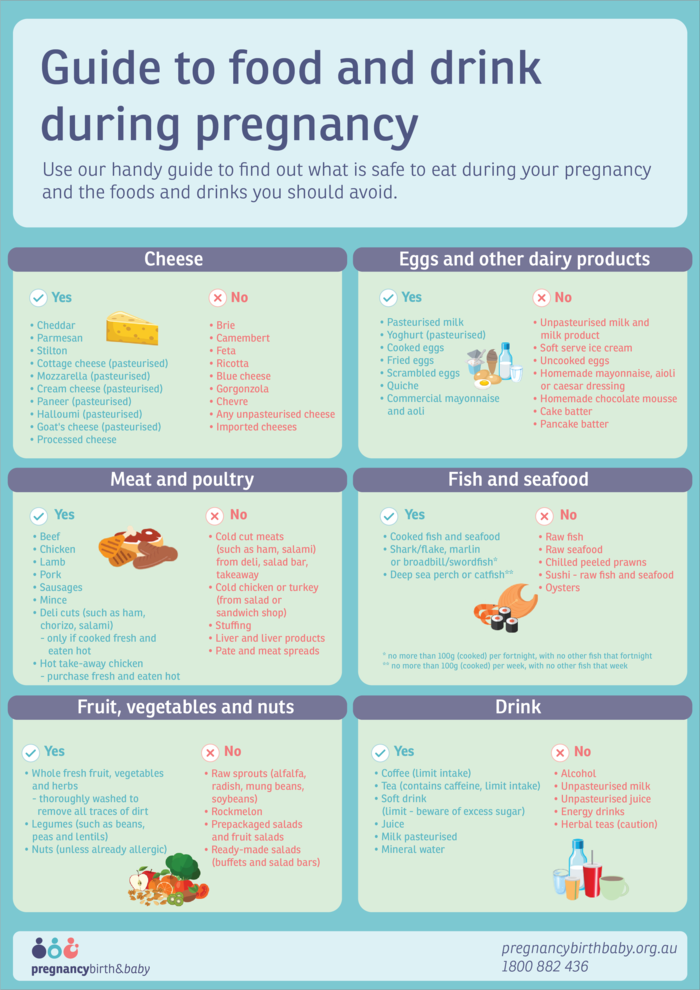How to tell if your child is faking sick
Is Your Kid Sick or Just Faking It?
Written by Kelli Miller
From a runny nose to belly woes, it can sometimes be tough to tell if your kid is truly stay-at-home sick or feigning illness to get a free pass from class. Do you need to call the doctor or could your child be pulling a “Bueller” on you -- a reference to Ferris Bueller’s Day Off, the 1986 movie where a teen fakes the flu, only to head out for a day of mischief once his parents have left the house?
Here's how can you become a sickness super sleuth.
Examine the Scene
Daniel McGee, MD, a pediatrician in Grand Rapids, MI, says you should compare what you see to what your child says.
“If your child is eating pancakes and sausage and complaining of stomach pains, then that is something you should probably ignore,” McGee says. “But if he is refusing to eat or drink, then that is something that you need to be more concerned about.”
Collect the Evidence
Arm yourself with two basic tools to collect hard evidence about your child’s health: a thermometer and a small flashlight.
“The old wives’ tale about feeling for a fever by placing a hand on the forehead just doesn’t work,” says Donald Ford, MD, a family doctor at Cleveland Clinic Hillcrest Hospital. Your hand tells you the outer forehead temperature. But you want to check if your child has a raised internal temperature, or a fever.
“The difference between temperatures is like what an oven knob is set to versus the temperature actually inside a turkey that’s cooking. They can be two different things, as anybody who’s ever ruined a Thanksgiving dinner can tell you,” Ford says.
Things like scrunching up under a blanket or putting a hot water bottle on the forehead can make your child feel warm, and they might use such tricks to try and fool you. But these things don’t necessarily raise your internal temperature.
“You can’t fake a fever,” says Marc I. Leavey, MD, a primary care specialist. “If your kid has a fever, they don’t want them in school.”
Doctors define a fever as anything over 100. 5 F. They aren’t worried about lower temperatures (although your school may be). Your child should have a normal temperature without using any type of fever-lowering medication, such as acetaminophen or ibuprofen, for 24 hours. Take your child’s temperature to be sure.
5 F. They aren’t worried about lower temperatures (although your school may be). Your child should have a normal temperature without using any type of fever-lowering medication, such as acetaminophen or ibuprofen, for 24 hours. Take your child’s temperature to be sure.
You can use the small flashlight to peer inside your child’s mouth. And make sure they say “Ahhh.” This pushes the tongue down so you can see the tonsils.
“If the child has white spots or white discharge coming from the back of the throat, the kid is probably sick,” Ford says. “It doesn’t tell you if he has strep, because you need a swab for that, but it’s still not normal.”
Prepare the Lie Detector
Like a fever or spots in the mouth, there are some other symptoms a kid can’t really lie about, but some they can. You want to hone your mom or dad skills if your kid comes to you with these woes:
Stomachache: This is the most common get-out-of-school complaint, and one of the most challenging to measure on the sick-or-faking-it scale.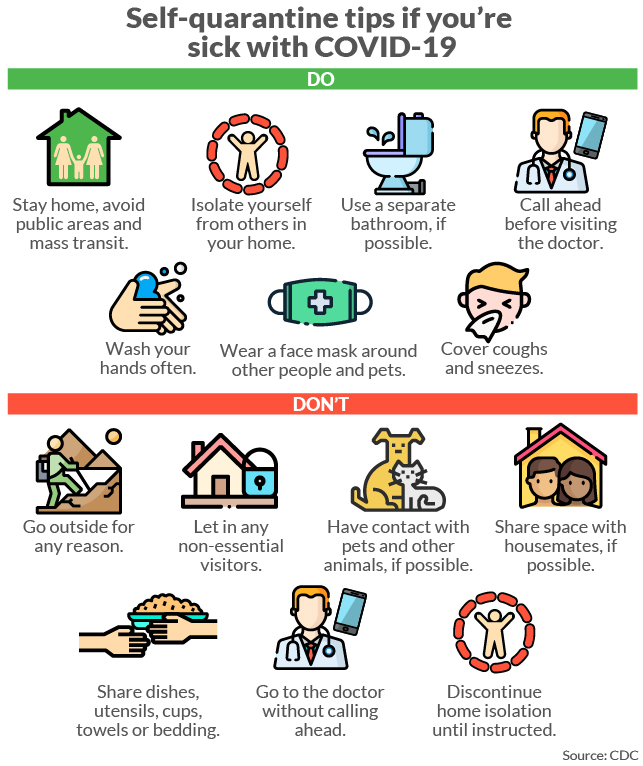
“Pain that seems to wander is probably not real,” McGee says. Also be suspicious of pain that comes and goes that your child can still play through.
Still, stomach troubles can be from all sorts of ailments, from anxiety to constipation to something more serious, like appendicitis. If your child has severe pain in the right lower belly and hasn’t already had their appendix removed, get immediate medical help.
Headache: There’s no physical sign to tell if your kid’s head really hurts.
“That’s true for doctors, too, most of the time,” Ford says. “If a child comes into my office with a headache, I simply have to believe that they have one.”
If your child complains of blurry vision or eye pain, it could be a migraine, and they might need a day of rest. If your child has a stiff neck with a headache and fever, keep them out of school and see a doctor right away to rule out meningitis.
If your child is vomiting along with the headache, check with your doctor.
Rash: “You can’t fake a rash. It’s hard to make marks on your skin,” McGee says. “Obviously a rash is real, but it may not be an emergency. For example, you don’t need to stay home from school for sunburn.”
A little bit of redness in a skin fold, on the elbow, or groin is likely nothing. But dial up your doctor if your child has a rash that covers a large part of their body and appears as red dots, in a lacy pattern, or as little pimples.
“These types of rashes are worth having a look at,” Leavey says. “We still have the chickenpox. Measles are still out there. Kids are not always vaccinated. And depending on where you live, Lyme disease is also a problem. These things all cause rashes.”
Vomiting and diarrhea: Fluid coming from somewhere it shouldn’t be is a red flag. Don’t send your child to school if they have diarrhea or is throwing up.
“Chances are pretty low that kids are going to make themselves throw up just to stay home from school,” Ford says, talking about basic illnesses and not eating disorders.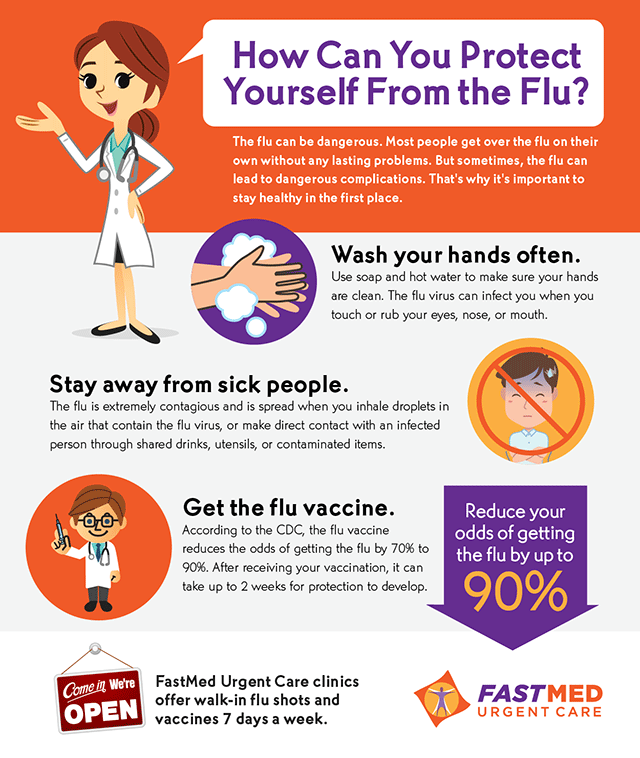 “They may tell you that they did, but if you can actually see or hear them doing so, then they are probably sick.”
“They may tell you that they did, but if you can actually see or hear them doing so, then they are probably sick.”
Runny nose: This can be a symptom of many health problems, but not all of them are stay-home-from-school worthy. You need to consider what else is going on with the child.
“If I look at a snotty nose, I can’t tell if it’s a virus or an allergy, I have to put in context,” Ford says. “If this is the first time your kid ever had the symptoms, it’s very likely a virus or cold.”
On the flip side, if your child sneezes and sniffles a lot, it could be allergies. Look for black eyes or bags under the eyes.
Colds and allergies aren’t likely a reason to ditch school. But if your child has a runny nose and a fever and cough, it could be the flu. Keep them home from school.
Backache: Plenty of adults miss work due to back pain, but kids aren’t likely to unless they have a history of injury. If your child does complain of back pain, make an appointment with their doctor.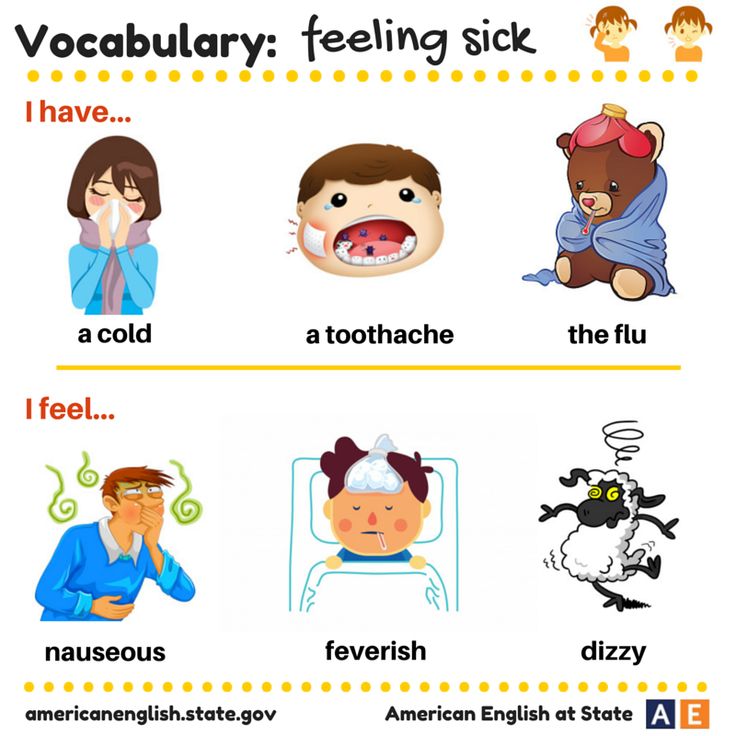
“Back pain in kids is one that goes in the never-ignore category,” McGee says. “Any time I see a child under 10 with back pain, then it's going to be something real and something not nice."
Have a Heart-to-Heart
Kids have faked illness to get out of taking a pop quiz. But sometimes, a child who says they’re too sick for school may be scared, worried, or anxious about something more serious.
“You have to turn up your parenting skills and try to listen to what’s really going on with your child,” Ford says. “Be aware that sometimes it’s not about faking it as much as it is about finding an excuse not to deal with an uncomfortable or even dangerous situation, such as getting teased or bullied.”
If You’re Not Sure
Sometimes, there’s not enough time in the morning before the school bus arrives to close your case. You might not know for sure if your child is faking it or not. You might need to wait an hour and see how they feel. Send them to school late if they perks up.
The bottom line: You have to know your kid.
“It’s not always easy to know if a child is faking sick or not, even for a trained professional. You just go with your gut,” Ford says. “It’s more about knowing your kid than knowing medical science.”
Is your kid faking sick? Here's what to do about it
Pretending to be sick is nothing new, but during the pandemic, an exaggerated headache comes with a huge ripple effect. Here's how to deal with it.
Watching the movie E.T. when I was 10 really upped my faking-sick game. Once I saw Elliott heat the thermometer against a bare light bulb in order to spend the day with his new alien friend, I realized I’d discovered a foolproof way to skip school.
From then on, when I hadn’t studied for a spelling test or if I just wanted to chill out eating Campbell’s soup and watching Star Trek reruns, I simply claimed I had a fever and let electricity inflate my temperature.
Like losing a front tooth or falling out of a tree, pretending to be sick to stay home is an elementary school rite of passage. To prove the point, my teenage daughter recently confessed that she invented cold symptoms to get out of school one day back in grade three. I don’t remember this, but apparently I was on to the con—my daughter says I refused to let her watch TV that day and made her stay in bed instead.
To prove the point, my teenage daughter recently confessed that she invented cold symptoms to get out of school one day back in grade three. I don’t remember this, but apparently I was on to the con—my daughter says I refused to let her watch TV that day and made her stay in bed instead.
Even though many children try it and it’s developmentally appropriate for school-aged kids, malingering still puts parents in an awkward position. Do you call their bluff and send them off or let them stay home and derail your day? And what if you sent them to school and they were, in fact, sick? It’s even more complicated in the COVID era, when a child who fakes a cough to avoid gym class or a math quiz can quickly spark a series of events that disrupts the routines of their entire cohort and their families—or, if that cough was real and your kid is actually sick, it could cause an even worse cascade of events. Ultimately, it falls on parents to figure out if their child is truly unwell and then make a call.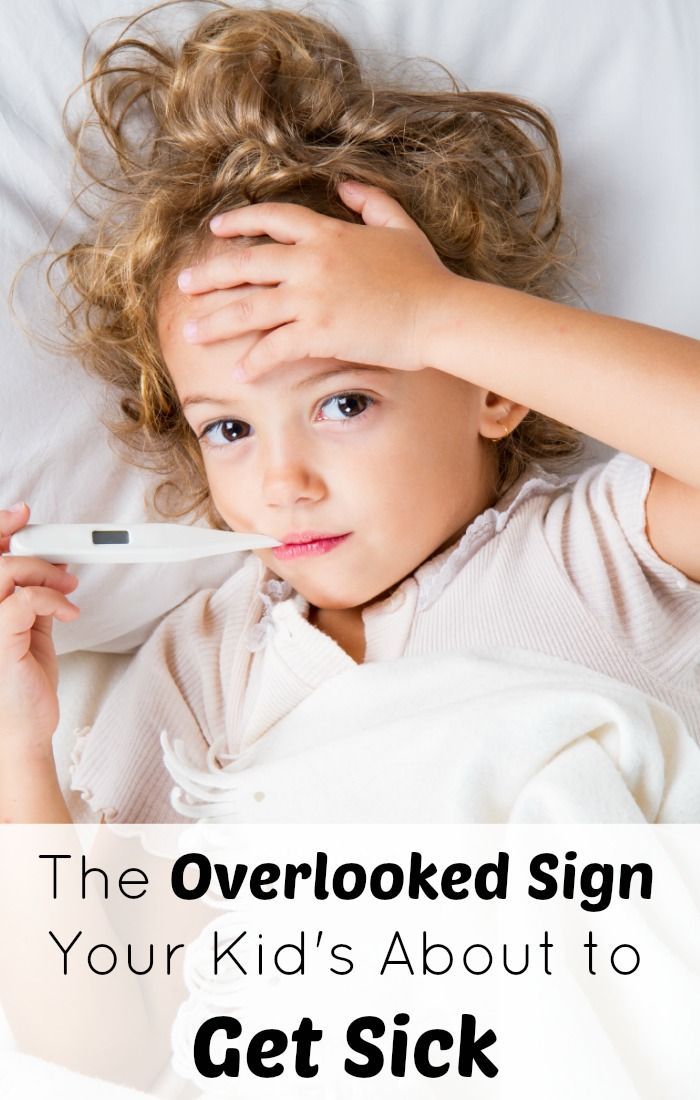 But how?
But how?
How to tell if your kid is faking sick
As parents, we know when our kids are sick sick. The vomiting and diarrhea, sky-high fever and flushed skin, zombielike lethargy, hacking cough or green boogers—these symptoms just don’t lie. It’s the unobservable symptoms that give us pause. “If I just scroll through what I’ve seen over the years when children are pretending, the common complaints would be ‘I have a headache’ or ‘I have a sore belly’ or another one is where supposedly they cannot walk,” says Peter Nieman, a Calgary-based paediatrician.
When parents relent and let the child stay home (when they suspect their kid is faking), there is often a miraculous recovery. The child who claims she has an upset tummy promptly eats a plate of eggs and bacon as though she’s forgotten about her nausea, for example.
Nieman urges parents to look for observable secondary symptoms that support the child’s primary complaint. If a child says
she has a headache that’s combined with dizziness or sleepiness, it’s probably legit. But if the headache victim puts in her ear buds and rocks out to loud music, you may have a faker on your hands.
But if the headache victim puts in her ear buds and rocks out to loud music, you may have a faker on your hands.
Jessica Moran, a mom of two in Brantford, Ont., has used this detective technique to determine whether her son Martin, 10, is truly unwell. In the past, he’s trotted out the tummy-ache excuse because Mom works from home and he’s seen a day off as an opportunity to play video games.
“He was smart enough to make the symptoms vague,” says Moran. She would observe Martin’s behaviour at breakfast (Did he wince in pain with each bite or gobble it down?) and take his temperature. If everything checked out, she sent him off to school. “I told him that once he was there, if his symptoms escalated, he could talk to the office, who would contact me to come and get him. The office never called.” Still, she did sometimes question herself and her decision.
Why is my kid pretending to be sick
There are many reasons children pretend to be sick. Beyond conjuring an illness to get out of school or avoid sports practice, kids might fake it due to a situational factor such as a new baby in the home or a sibling who’s sick (so they want to stay home, too). “Also, honestly, I think kids are just tired sometimes,” says Sarah Rosensweet, a Toronto-based parenting coach. “Five days a week, eight hours a day, 10 months a year. That’s a lot of school. Sometimes kids miss their parents because they don’t have enough time to connect.” In fact, Rosensweet is a big proponent of what she calls “home days” (sometimes called mental health days). Her mom let her have days off as a child, and she’s carried on the tradition with her own three children.
“Also, honestly, I think kids are just tired sometimes,” says Sarah Rosensweet, a Toronto-based parenting coach. “Five days a week, eight hours a day, 10 months a year. That’s a lot of school. Sometimes kids miss their parents because they don’t have enough time to connect.” In fact, Rosensweet is a big proponent of what she calls “home days” (sometimes called mental health days). Her mom let her have days off as a child, and she’s carried on the tradition with her own three children.
When pretending to be sick becomes chronic
There’s a big difference between a child who’s just not feeling it every once in a while and one who develops a sore throat and headache every Monday at 7 a.m. When an imaginary ailment surfaces regularly, it’s a red flag, say experts. “It can be like the tip of an iceberg,” says Nieman, who sees a lot of stressed-out, anxious and depressed kids as young as five or six. “Dig a little bit deeper, see if the kid is happy, find out about bullies.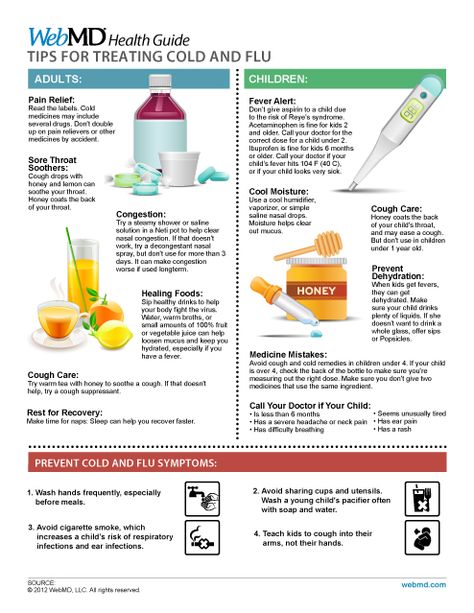 ”
”
Rosensweet recommends speaking with a teacher to see how your child is doing overall. Are there any social problems? Do they have friends? How are they doing with school work? “Another reason kids might want to stay home is if they’re having trouble with academics,” says Rosensweet. “Maybe they have an undiagnosed learning disability. They might feel like school is hard but they can’t explain why.” Maybe they just aren’t getting along well with their teacher this year or simply don’t love all the school work.
Kathryn Grossman* nearly flipped her lid when her seven-year-old son, Jared*, turned up “sick” in the school office not once but three times over the course of three weeks at the beginning of the 2020 school year. The first two times, he claimed to have a headache and stomach ache, so Grossman picked him up from school and brought him home—only to watch him head straight for the snacks and iPad. He did remember to act sick whenever she asked how he was feeling throughout the day, though.
After the second incident, Grossman spoke to Jared before bed about the importance of being honest about his symptoms. “I told him that pretending to be sick is never OK, but especially now; if he pretends he is sick, his teacher and friends might think he has COVID, and that might scare them,” she says. She also explained that others might worry about catching COVID from him. Unfortunately, the grade two student wouldn’t confess, says his mom. “He got defensive and insisted he didn’t pretend.”
The third time, Jared complained he was winded and couldn’t breathe during gym class. This time, Grossman opted to leave him at school after speaking with the school secretary, who said he seemed fine. The faking hasn’t happened again.
Grossman thinks that a general dislike of school academics—combined with a pattern of more screen time at home over the spring and summer (because: COVID)—prompted Jared to see if he could ditch class by pretending to be sick. She also believes the faking finally stopped when he settled into a school routine, and possibly because he realized his parents weren’t falling for it anymore.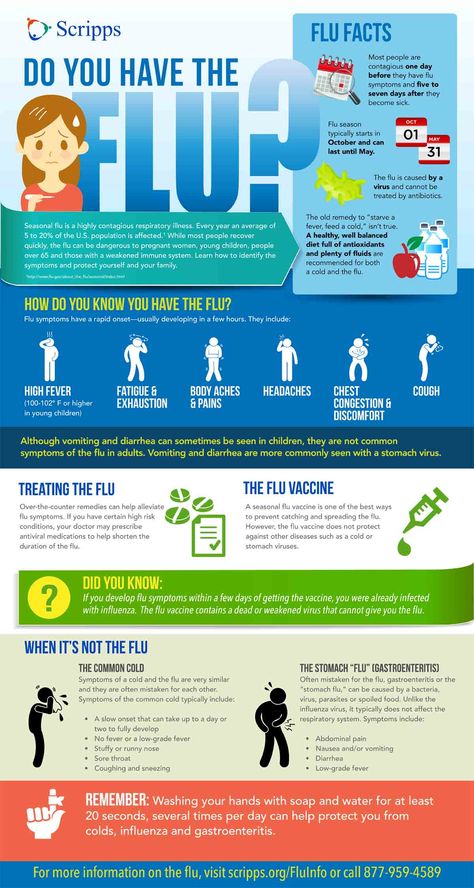
Be empathetic during COVID
Even if you’re pretty sure you’re being conned, experts advise letting your child stay home, if at all possible. That’s a tough message for working parents to hear, but as the pandemic rages on, there’s just too much at stake. Not to mention the optics of sending a child to school who’s complaining about a sore throat or upset stomach—no one wants to be that parent. “In the time of COVID, it’s best to be very cautious, just to be safe,” says Nieman.
If you’re 100 percent certain it’s an act, though, it’s still not necessarily best to call them out as lying. They’re likely to double down. Instead, opt for a gentler version of tough love. “Focus less on whether or not they’re telling the truth and more on the fact that they have to go to school,” says Rosensweet. “Sometimes we have to do hard things even when we have a headache.”
Another tactic that seems to stop faking in its tracks, say experts, is making sick days ridiculously boring: no treats, no screens, just rest. Kristen Halpen, a mom in Calgary, credits this strategy with ensuring that her two sons have never (to her knowledge) faked a fever, cold or upset stomach. “I think setting the stage pre-pandemic for sick days, their isolation and a lack of entertainment—no TV, no electronics—has worked and will help mitigate sick says into the future,” she says. “Knock on wood.”
Kristen Halpen, a mom in Calgary, credits this strategy with ensuring that her two sons have never (to her knowledge) faked a fever, cold or upset stomach. “I think setting the stage pre-pandemic for sick days, their isolation and a lack of entertainment—no TV, no electronics—has worked and will help mitigate sick says into the future,” she says. “Knock on wood.”
At the end of the day, we’re all just getting through this pandemic, and although a mental health day could be disruptive to your routine, it could really help your kid. “Always remind yourself that your child is doing the best they can,” says Rosensweet. “They’re not giving you a hard time—they’re having a hard time. They’re not just trying to mess up your day. There’s probably something going on, so try to be empathetic.”
*Names have been changed
Stay in touch
Subscribe to Today's Parent's daily newsletter for our best parenting news, tips, essays and recipes.
- Email*
- CAPTCHA
- Consent*
Yes, I would like to receive Today's Parent's newsletter. I understand I can unsubscribe at any time.**
FILED UNDER: coronavirus health service viral illness Kids health Parenting Sick kid
Sick or pretending? What's Behind Children's Complaints
Suddenly a child complains about not feeling well - and this usually happens in the morning before kindergarten or school. Not believing is scary, believing all the time - it seems there are no real reasons? Psychologist Anna Skavitina tells how to properly respond to complaints about health and what they may indicate.
Anna Skavitina, psychologist, analyst, member of the IAAP (International Association of Analytical Psychology), supervisor of the ROAP and the Jung Institute (Zurich), expert of the Psychology journal
It hurts a lot!
Early in the morning before kindergarten or school, you suddenly find that the child is coughing, or he has a terrible stomach ache, and maybe his head, or other parts of the body.
The problem is, just a few minutes ago, he was fine. Perhaps he is deceiving you - and simply does not want to go anywhere?
Most of us tried this trick as kids - I know I did too. It was necessary to heat the thermometer on the battery, cough several times and stay at home to read an interesting book - instead of walking in the dark through a snowstorm to school. Most cases of sudden "mysterious morning sickness" are due to fairly innocuous causes. But there are more insidious ones that we as parents need to be aware of so that we can help children eliminate the difficulties that make them want to miss school or kindergarten. Sometimes you have to work with a pediatrician, a psychiatrist and a psychologist to figure out how real or imaginary the child's illnesses are. nine0003
There are many reasons why a child might say they are sick when they are not.
Perhaps he needs a "mental health day" away from school or kindergarten, just needs a day off to relax and recharge.But maybe the child is addicted to video games and prefers to stay at home in bed all day playing on the computer while the parents are at work.
Pediatricians call this "simulation", when the child deliberately fakes the symptoms for some benefit, or "contrived disorder" - when the symptoms are only in the imagination, and the child is confused about what they are. But in other conditions, such as, for example, a somatic disorder and various pain syndromes, the child's symptoms are real, that is, everything really hurts, even if the underlying disease is not detected. nine0003
What to do if the child pretends to be sick
Look for a problem. Although not many children enjoy going to school every day, the vast majority are ready to admit that going to school is an integral part of life. Therefore, if your child constantly tries to cough or sneeze before leaving the house, he suddenly feels sick, it is important to find out why. For example, children may feel sick. because of fear.
because of fear.
The child may be experiencing one or more of the following:
⁃ A new bully has appeared in a class or group who annoys your child. Children who are bullied often feign illness because they are afraid to report their tormentor and anger him even more.
⁃ The student is now struggling with a new subject: mathematics, foreign or native language, reading. Or today there is an important test or control.
⁃ The child does not like the new caregiver or teacher, or there have been changes to the class schedule: even small changes can provoke anxiety. nine0018 ⁃ The child wants extra attention from you because he has not seen you often lately;
⁃ He is very tired and overworked, he wants to be alone at home and rest.
⁃ He worries about your health and wants to see how you manage at home without him if you don't go anywhere.
Make sure the child is not really sick. Look for measurable physiological symptoms: take temperature, evaluate behavior (suddenly happy one moment and laughing the next) and look for other tell-tale signs of real illness (persistent or inability to sleep, lack of appetite, frequent toilet visits, etc. ) .). If a child has a stomach ache and is really sick, it is unlikely that he will eat his favorite pancakes for breakfast with appetite. Following all of these steps will help you understand what is really going on and if you have medical reasons to be concerned. nine0018 Sometimes it's important to ignore the words and look at the behavior. Offer to go see the doctor after school today instead of walking with friends - you may be miraculously healed in a few minutes. Or agree that the child stays at home in bed, but without the Internet and set-top box. Look at the reaction.
) .). If a child has a stomach ache and is really sick, it is unlikely that he will eat his favorite pancakes for breakfast with appetite. Following all of these steps will help you understand what is really going on and if you have medical reasons to be concerned. nine0018 Sometimes it's important to ignore the words and look at the behavior. Offer to go see the doctor after school today instead of walking with friends - you may be miraculously healed in a few minutes. Or agree that the child stays at home in bed, but without the Internet and set-top box. Look at the reaction.
Communicate. If you do not listen to the "little things and stupid things" that the child tells, it will be difficult for him to tell you something more serious another time. Talk to your children constantly. Don't wait for someone to say they are sick. Ask questions and find out what's going on in your son's or daughter's life. Discuss their daily activities, especially what they do at school (in studies and in communication with children).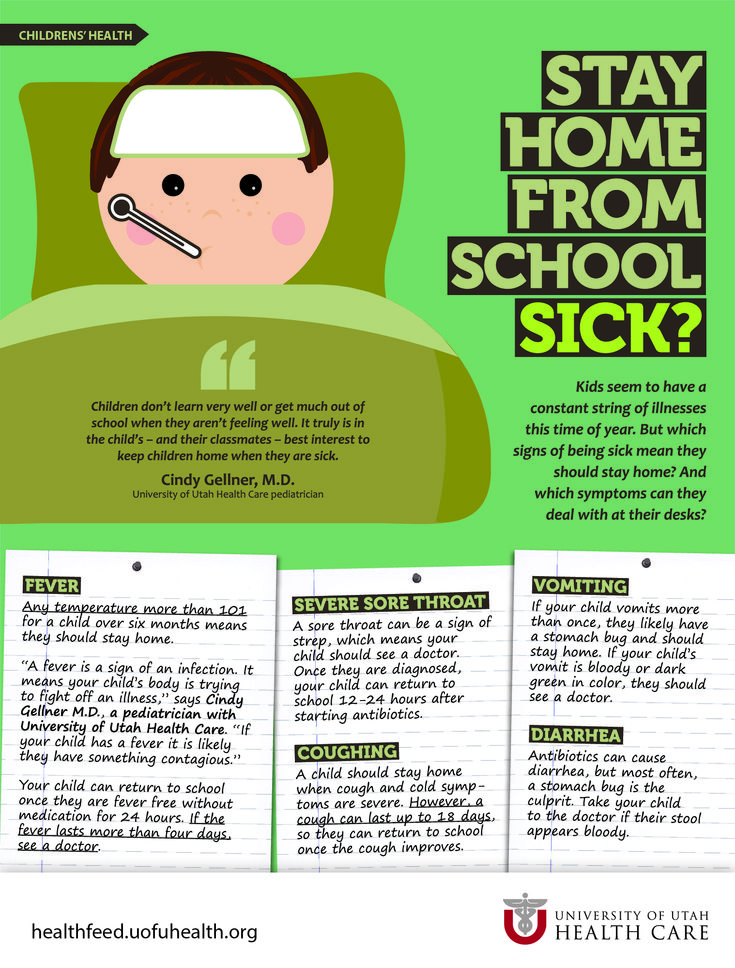 Sometimes it's difficult, but if you can make conversation with your child on difficult topics regular and safe, then the true reasons for his reluctance to go to school will become apparent. nine0003
Sometimes it's difficult, but if you can make conversation with your child on difficult topics regular and safe, then the true reasons for his reluctance to go to school will become apparent. nine0003
Make a list of resources. It may well be that the child's problem is more complex than you initially thought. Then it's time to call for support, starting from school: talk with the class teacher, subject teachers, school psychologist. Most educators are happy to help parents and children solve any problems that arise. They can see what you do not see and what the child does not tell.
Don't rush. Your first impulse may be to say "It's all right!" or “No, you are not sick! You immediately go to school." If a child regularly pretends to be sick, then the lack of support from parents can only complicate already serious problems. Gentle touches and gentle questions are likely to bring you much more information than following rigid boundaries that may prevent him from revealing what is really going on. It takes an empathetic and patient person—a parent, a teacher, a friend—to help identify the problem behind the complaint. And sometimes it’s worth skipping school, but understanding what to do next. nine0003
It takes an empathetic and patient person—a parent, a teacher, a friend—to help identify the problem behind the complaint. And sometimes it’s worth skipping school, but understanding what to do next. nine0003
We want to understand children's feelings. One of the most important things is to name the feelings of the child and try to somehow understand where this feeling comes from, what it wants to tell us.
It is helpful, especially for older children, to say, for example, "Your behavior indicates that something is bothering you, but it may be difficult for you to talk about it." You have no idea how many adults have said to me, "I've always wanted my parents to tell me, 'you can come to me and talk about anything'." Many children, especially teenagers, are really afraid to talk to their parents, expecting yelling or ignoring their experiences. We, parents, love our children, but it is often difficult for us to see their imperfections, their problems, to face their and our difficult feelings.
But if not us, then who else can help them? nine0003
Read also:
How to teach a child the right attitude to grades
9 ways to deal with psychosomatic illnesses
Another cold: what to do with a sick child?
Photo: Polina Tankilevitch/Pexels, Alexander Dummer/unsplash, Victoria_Borodinova/pixabay
psychologyeducation
My son pretends to be sick | Mothers today
Who hasn't succumbed to the temptation to pretend to be sick to miss out on a commitment? nine0016 Boys and girls do this too, and to some extent it can be considered normal. . But if this behavior is already common, you should take action about it. And find out why.
There are various possible reasons why your child pretends to be sick, from attracting attention, demanding more society, jealousy or fear of going to school or not doing this or that extracurricular task.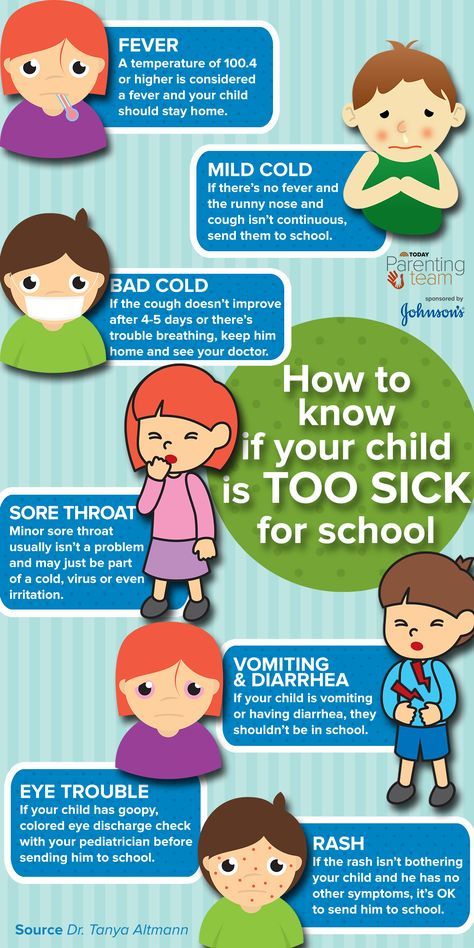 Determining the cause will help you deal with this behavior. Here are some ideas. nine0003
Determining the cause will help you deal with this behavior. Here are some ideas. nine0003
Index
- 1 Reasons why a child pretends
- 2 If your child feigns pain or injury
- 3 Tips for dealing with your child's pretending
Reasons why a child pretends
2In general, children fake diseases for various reasons. They may pretend to be sick just to avoid certain tasks or activities of like taking his room, going to visit some relatives, going to school... if it's an isolated time, you shouldn't attach any more importance to it. But if every time we suggest such a task or action, he does it, we will have to ask ourselves and ask him what is wrong with him? and find out the reason for the truth. nine0003
Your child may just pretend to be because it requires more attention from you . This sometimes happens when a new element appears in the family, it can be a couple, a younger brother or sister. This can also happen without a new element, your child is just going through a stage where he likes to get extra attention from you, even if there are no serious problems.
This can also happen without a new element, your child is just going through a stage where he likes to get extra attention from you, even if there are no serious problems.
In children from five to ten years old, quite often they do not want to go to school and pretend to be sick, in general they say that they suffer from paralyzing fear of having to leave a safe family and home. In addition, children may pretend because of anxiety, bullying, or learning problems.
If your child is feigning pain or injury
Sometimes, as mothers, we want our children to be the best at everything and push them to achieve many goals. This pressure works against them and So-called phantom lesions begin to appear in athletic boys and girls. We can say that these are diseases that they themselves pretend, just to get the rest that we do not give them. nine0003
In general, when children complain of pain, when they do not find any injury, the doctor finds out the relationship they have with their parents or coach, since the symptoms are fictitious.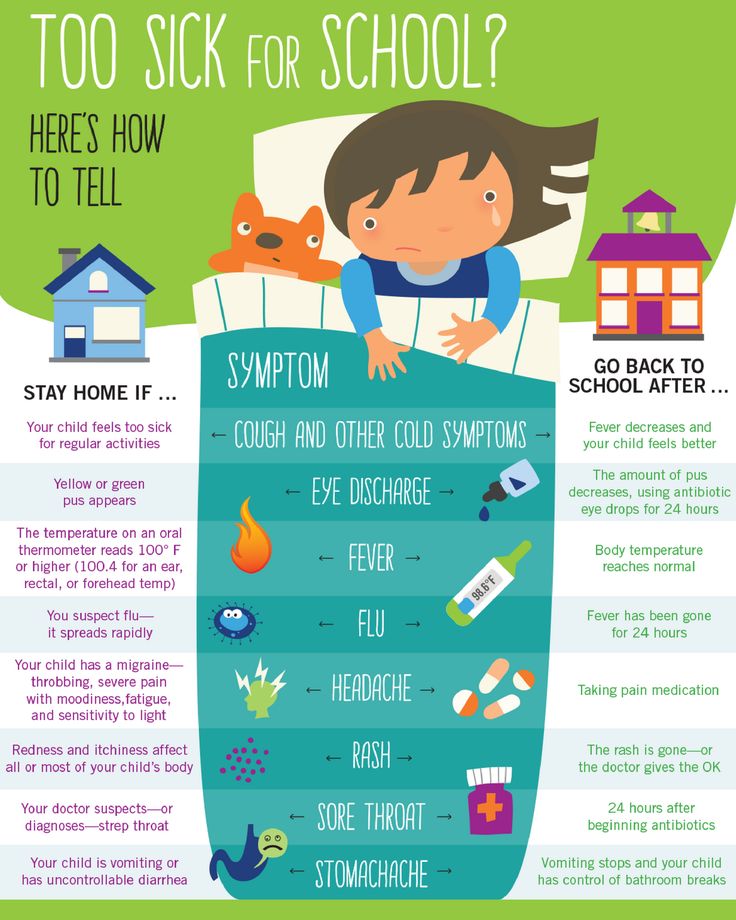 This is more common than it seems. As mothers, it is important that we understand that at an early age we should enjoy sports, and not pressure them with results.
This is more common than it seems. As mothers, it is important that we understand that at an early age we should enjoy sports, and not pressure them with results.
Mothers should adopt a positive attitude when our children are doing things, and have a good time. Without that implied pressure, purpose, competition for boy or girl, which, if not enough, will end up frustrating us and frustrating them. nine0003
Tips for dealing with your child's pretending
Experts recommend being aware of the factors that cause your child to pretend . But in general, once serious situations have been ruled out, we are advised not to take care of a child when we are sure that he is faking. You will most likely get tired of pretending.
On the other hand, in an additional way encourage the child to continue homework, despite the fact that he is “sick” and provide positive reinforcement and rewards on the days he is not faking it.


